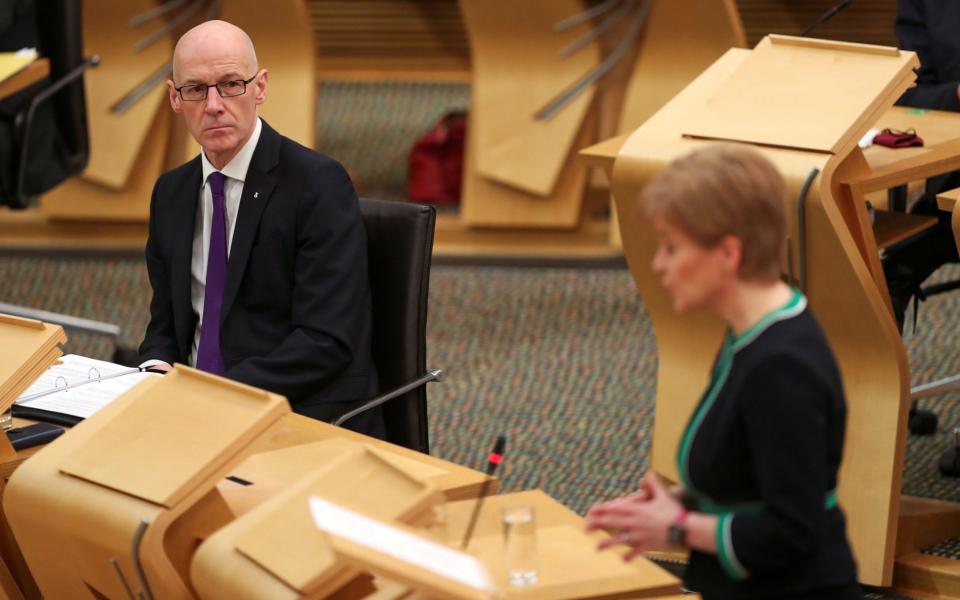Refusal to hand over Salmond legal advice is 'convincing MSPs that conspiracy claims are credible'

A refusal by SNP ministers to release legal advice about the Alex Salmond affair is adding credibility to claims that he was the victim of a politically-motivated conspiracy, MSPs have said.
Last night, Holyrood voted for a second time for secret documents held by ministers to be released, with John Swinney, the deputy first minister, accused of "rolling out one mortifying excuse after another" for not complying.
The legal advice is seen as crucial as SNP ministers and civil servants have been accused of pursuing the case against Mr Salmond at public cost, despite knowing they had little chance of success, due to a vendetta aimed at preventing him from making a political comeback.
Mr Salmond successfully challenged the legality and fairness of a civil service probe into sexual harassment complaints against him, with the case costing taxpayers more than £512,000.

The ongoing Holyrood inquiry relates to the botched civil service investigation. Mr Salmond was cleared of 13 charges of sexual assault after a separate criminal investigation at his trial in March. He has always denied any criminality.
On Wednesday night, MSPs voted by 65 to 55 for the legal advice to be published.
Jackie Baillie, the Scottish Labour MSP, said it was clear that the government had no intention of handing over the documents.
A member of the committee investigating the affair, she said MSPs had faced repeated obstruction from ministers in their efforts to uncover the truth.
She said: “I was never a great believer in conspiracy theories, they were just a tad too far fetched for my taste.
“But the more the SNP refuse to cooperate with the parliamentary committee, the more I think there might just be something in it.”
When the parliamentary inquiry was set up, Nicola Sturgeon promised that the government would “provide whatever material” requested.
However, she has reneged on the pledge and recused herself of decision making, instead delegating responsibility to Mr Swinney.
Scottish Liberal Democrat MSP Alex Cole-Hamilton warned the Deputy First Minister he may face a vote of no-confidence within days if the legal advice is not handed over.
Important point made in this debate by @jackiebmsp: when Westminster voted to demand that the UK Govt release its legal advice on Brexit, it was provided the next day. Puts to shame the refusal of the SNP Govt to respect the will of Parliament in relation to the Salmond case.
— Murdo Fraser (@murdo_fraser) November 25, 2020
Murdo Fraser, the Tory committee member, said Mr Swinney’s “credibility has been shattered by defending the indefensible”.
He added: “It’s clearer than ever that the SNP have something damning to hide. The SNP’s chief fixer rolled out one mortifying excuse after another to try and explain away the shameful drive to avoid scrutiny at all costs.”
While there is a presumption that governments do not release legal advice, this can be overridden in exceptional circumstances and SNP ministers have released it about other matters in the past.
Mr Swinney told MSPs that "no final decision has been made by the government" about publishing the advice, but claimed there could be a "very real potential for negative consequences".
He suggested that it could create a precedent that could "potentially undermine the ability of the government to receive legal advice".
Meanwhile, Mr Salmond's lawyers accused the SNP of potentially defaming the former party leader.
Mr Salmond’s representatives claimed that a briefing circulated to nationalist MSPs ahead of the crunch Holyrood vote was inaccurate.
David McKie, of Glasgow-based Levy & McRae, said the document implied criticism of both Mr Salmond and his firm, and did not give “the whole picture”.
He said: “On one view it is defamatory of both our client and us as it suggests that we have delayed and been uncooperative.”
Mr Salmond's lawyers have also asked the Scottish Government to help pay Mr Salmond’s legal expenses, saying as a private citizen he was having to pay costs personally while the Scottish Government had legal support funded by taxpayers.
An SNP spokesman said: “Stating facts is not defamatory in Scotland.”


